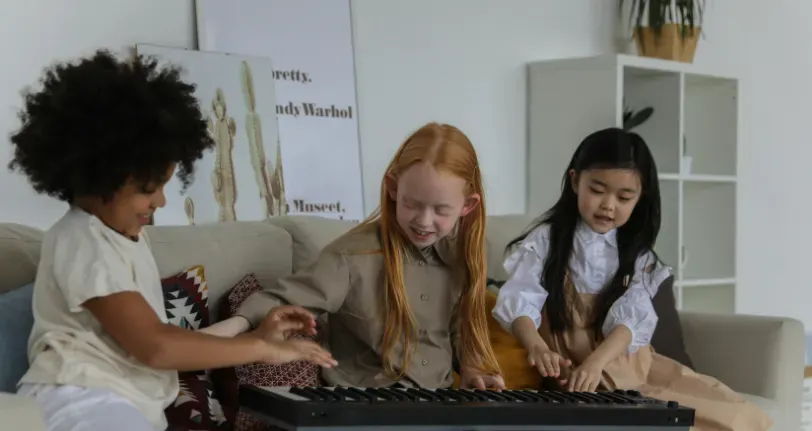The Power of Connection: Creating Meaningful Relationships for Girls
In the journey of life, the significance of building positive and meaningful relationships cannot be overstated, especially when it comes to our daughters. As parents, we have a profound influence on how our daughters view friendships and connections. It's crucial to recognise that our daughters are constantly observing and listening, registering the programming we unknowingly impart to them. In this blog post, we will explore the impact of parental modelling and dive into the world of our daughters forming friendships at school. We will also provide guidance on how parents can support their daughters in cultivating meaningful connections, while empowering them to identify friendships that may have a negative impact.
Parental Modelling: The Hidden Influence
Our daughters absorb crucial information by observing the relationships around them, including our own friendships and partnerships. They learn about empathy, respect, and commitment from the examples they see at home. As parents, it is our responsibility to model healthy friendships, showing kindness, trust, and support in our interactions with others. However, we must also be aware of the subtle ways in which we communicate and remember that our daughters are keen observers.
For example, we may find ourselves laughing and sharing pleasant moments with our friends when our daughters are present, but then later engage in negative discussions or vent to our spouses about those very same friends. It is essential to be mindful of this and recognise that our behaviour has a lasting impact on our daughters. They are observing not just the smiles and laughter but also how we handle disagreements or differences of opinion.
By being aware of the impressions we make, we can model respectful and authentic relationships for our daughters. This means treating our friends with kindness and respect both in their presence and behind their backs. Acting with integrity and authenticity not only sets a positive example but also helps to build trust and create meaningful connections in our daughters' own friendships.

Understanding School Friendships
As our daughters grow and form friendships at school, it is our role as parents to take an active interest in the people they choose to surround themselves with. While we want our children to explore and develop their own friendships, it remains important for us to vet the friends they bring into their lives. This doesn't mean hovering or being overprotective, but rather staying aware and gaining insight into their friends' families. We must teach our children to be respectful and accepting of others while also guiding them to seek friendships with girls who share similar values.
This extends to the influence of best friends. Best friends hold a special place in our daughters' lives. As they become more independent and start to trust their peers, they may value their friends' opinions more than our own. While we trust that their friends have good intentions, as parents, we always have our children's best interests at heart. Therefore, it's essential to take the time to know your child's best friend and their family, understanding where their family values lie.
It's not enough to simply exchange greetings or have superficial conversations at school or social events. Building a connection with your child's best friend's parents can be incredibly valuable. By fostering a genuine relationship with them, you not only gain insight into their family dynamics but also create a support system for your child. This deeper connection allows for shared values and consistent messaging between parents, which can strengthen your child's overall social experience.

Cultivating Meaningful Friendships
To help your daughter cultivate meaningful friendships, start by encouraging open communication within your household. Create an environment where she feels comfortable discussing her friendships and experiences openly. Teach her the qualities of a good friend - kindness, loyalty, trust, and empathy. Encourage her to participate in activities and communities aligned with her interests, where she may meet like-minded peers. Encourage acts of kindness and inclusiveness, emphasising the importance of embracing differences.

Identifying Negative Friendships
When it comes to identifying negative friendships, parents often choose to teach their children to stand up for themselves in the face of toxicity. Encouraging our daughters to have a backbone and stay strong is an essential aspect of navigating difficult relationships. However, while it is important to empower our children to assert themselves, we must also be mindful of striking a delicate balance.
In teaching our children to distance themselves from toxic friendships, we should not inadvertently convey the message that they must endure the presence of toxic people or that they need to change themselves to develop resilience. It is equally powerful for our daughters to recognise their worth and understand that it is better to have no friend than a toxic friend.
By instilling a sense of self-worth, we empower our daughters to walk away from friendships that do not align with their values or bring them happiness. Teaching them that it is okay to prioritise their mental and emotional well-being sets the stage for them to form healthier connections in the future. Encourage your daughter to trust her instincts and listen to her gut feelings when it comes to assessing the impact of a friendship.
Combining self-assertion with self-worth, we can teach our daughters that standing up for themselves requires strength and resilience. It means understanding their own boundaries, setting limits on what they are willing to tolerate, and expressing their needs and concerns assertively. Empowering our daughters with these skills will enable them to navigate negative relationships with confidence and make decisions that prioritise their emotional well-being.
Building positive and meaningful relationships is a transformative experience for our daughters. As parents, we have the power to shape their understanding of friendships and connections through our modelling and guidance. By being mindful of our own actions, we can inspire them to develop healthy relationships built on respect, empathy, and trust.
Disclaimer: At My Modest Girl, we value transparency and want to be upfront with our readers. We occasionally use affiliate links throughout our content. These links allow us to earn a small commission when you make a purchase through them.
It's important to note that this doesn't affect the price you pay for any products or services. The commissions we receive help support the maintenance and growth of our blog, allowing us to continue providing valuable content to our readers free of charge.
